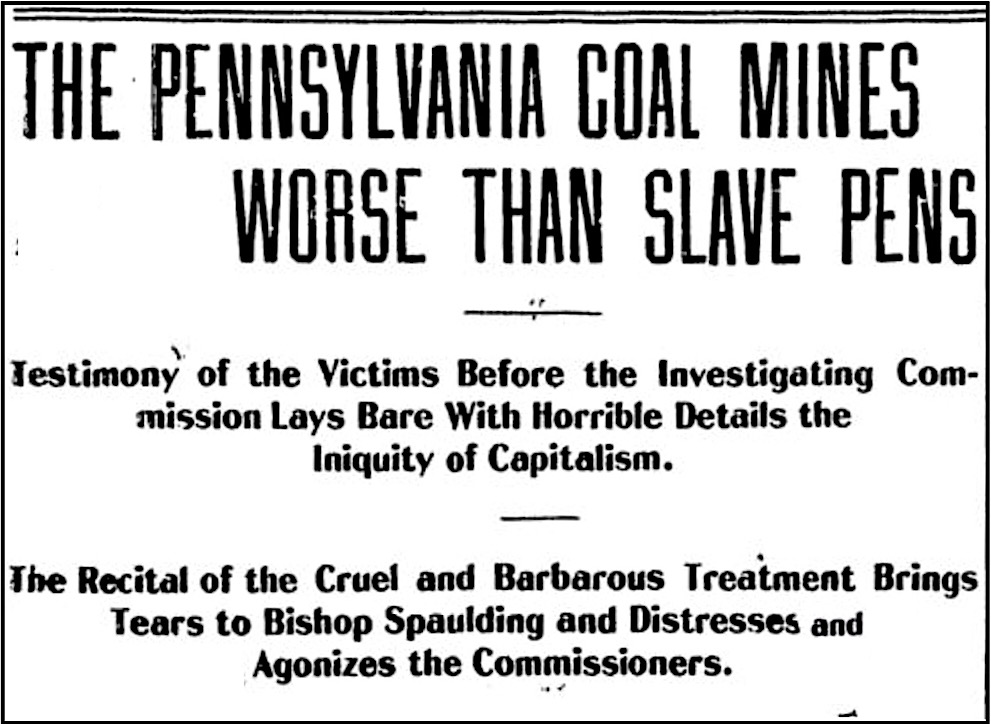 —————
—————
Hellraisers Journal – Sunday December 21, 1902
Scranton, Pennsylvania – Misery of Miners’ Lives Describe Before Coal Commission
From the Butte Labor World of December 19, 1902:
The other day members of the strike commission wept when a miner told his simple, straightforward story of incredible ill-treatment-of inhumanity that astounded the judges.
The veil was raised a few inches higher-and the commissioners were astonished as they looked beyond. Bishop Spalding swung around in his chair, turning his back upon the courtroom to hide his tears. Assistant Recorder Mosely made no attempt to hide his. Judge Gray’s face was white and there were hard, indignant lines about his mouth as he echoed the words of the coal trust lawyer: “Yes, that is all,” adding, “and it is enough!”
If there be lower depth of human misery than those in which these miners live they have never been fathomed.
Millions have wept over the sorrows that plied upon Jean Valjean, but Victor Hugo’s hero was never a more heartrending type of misery than was old Henry Coll [Call] as he told how he had bent his back under the brutal yoke of men who have posed before the country as philanthropists and claimed a God-given right to this positions as employers of labor.
Coll had had every bone in his body, except his neck, broken in the service of these people; and after the strike had been turned out of his house-a poor place, it is true, but the only home he knew-with a sick wife, her hundred-year-old mother, his son and the children to two comrades who had been killed at work, and with whom he in his charity had shared his home. They had been turned out at a moment’s notice into the cold street to perish. His wife had died as the result of the exposure and he had just come from burying her to tell his story.
Then there was the tale of Kate Burns. Her husband had been killed also working for these taskmasters, and to live she had sent her little boys to the breakers. There they had slaved for 78 cents a day, but never received a cent of pay in fourteen years, their earnings being applied by the company to paying the rent, while she, by washing and scrubbing, had earned barely enough to support the little family.
It is the rich men who imposed hardships like these upon those who work for them that refused to arbitrate and insulted the president when he suggested it.
But the veil is up and the horrors behind it are being laid bare for all the world to see.-N. Y. American.
—————
MARKLE’S SLAVES TELL OF THE EVILS
———-Tuesday, December 9, was a day of horrors at Scranton, Pa., for those who listened to the evidence before the strike commission. The pathetic stories of the former witnesses were almost forgotten as the stories of still more unfortunate slaves of the miners were told.
John Markle, who had almost achieved the reputation as the philanthropist of the coal field, was not present to contradict, the stories of his employes, nor was there any legal representative to attempt to discredit these stories or to soften their influence upon the members of the commission…..
[Emphasis added.]
Note: the article goes on to describe testimony from:
Mrs. Kate Burns, widow: husband killed in mines, children forced to work in mines, forced to go to work washing and cleaning as soon as baby born.
Henry Coll: Evicted with wife, children and very elderly mother-in-law, had been severely injured in mines, wife ill when family evicted and died shortly thereafter.
Michael Baker: age 18, had frequently been clubbed, beaten and sworn at by breaker boss.
Ella Chippe [Chippa], widow: husband died in mines, son (Andrew) forced to work as breaker boy, son’s pay taken to pay debts, baby born after death of husband.
Mary Ann Raber, widow: husband killed in mines with Mrs. Chippe’s husband, four children to support, son sent to work in mines,
Testimony given by miners proves that they are over-charged for doctor’s fees, for powder, and underpaid for the coal they mined due to coal cars continually increasing in size. Price of groceries increased by 30% since 1900.
—————

